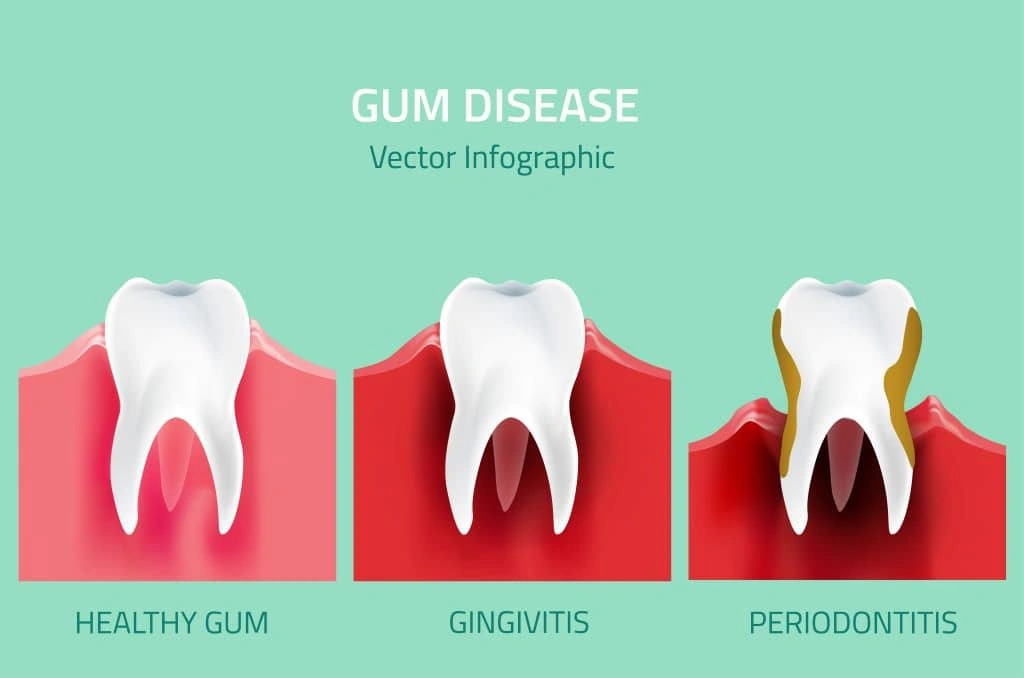Periodontal Treatment Near You
Periodontal (gum) disease is characterized by inflammation caused a bacterial infection. The infection occurs because of plaque and tartar that has amalgamated on the teeth. If this is not addressed by a dental professional, restorative procedures may be necessary.
Fortunately, visiting a dentist near you and maintaining good hygiene can help you avoid this. For more information about periodontal treatment, contact Lincoln Dental.

Periodontal Care: Looking Closer
In most cases, gum disease impacts older individuals, but it can still develop in younger patients. Genetics can play a role alongside hygiene practices. Smoking, diabetes, and other general health conditions are also known to contribute to the development of the disease.
Some notable symptoms include:
Swollen, red, or bleeding gums
Bad breath
Pus near the gum line
Loose feeling teeth
Gum recession
Your teeth don’t fit together properly
Hurts to chew
Tooth loss (in severe cases)
Get in touch with a Coquitlam dentist right away if you or a loved one are experiencing any of these issues.
Stages of the Disease
| Gingivitis | Mild Periodontitis | Moderate to Severe Periodontitis |
|---|---|---|
| The earliest stage of the disease | If gingivitis is left untreated, it turns into mild periodontitis | The most serious stages |
| Red and swollen gum tissue | Gums start to recede, creating pockets | Bone deterioration, erosion of the ligaments surrounding the teeth, eventually resulting in tooth loss |
| Treatable if caught early | Cannot be reversed, only managed | Often requires advanced procedures to manage |
What Treatments are Available?
Treatment recommendations will depend on the extent of the disease. Here is what your dentist can recommend:
- Scaling and Root Planing: This is very similar to a traditional cleaning. However, anesthesia is provided to prevent sensitivity and discomfort that can arise due to the gums being tender and sore. Amalgamated bacteria are cleared away and the tooth roots are carefully smoothed out to prevent receding gums. Patients may need to come in for multiple appointments.
- Antibiotics: Your dentist can prescribe you special medication to address infection. It can be oral or topical.
- Dental Grafts: Bone grafts can be to address bone deterioration. This involves taking tissue, either your own, from a donor, or artificial tissue, and adding it to the jaw to increase its volume and provide extra support. The same can be done with gum tissue.
- Dental Implants or Dentures: Restorations like implants or dentures are two great options that can fill in gaps left by teeth that have been extracted or fallen out due to gum disease. Implants are titanium screws embedded in the jaw to strengthen it and prevent deterioration. Dentures can restore several missing teeth or replace an entire arch.
Don’t Wait to Get the Care You Need
For effective periodontal treatment near you, come speak with one of our dental professionals. They can examine your smile and devise a personalized treatment plan.
Don’t hesitate to call 604-552-9500 to book an introductory appointment with us. We look forward to helping you care for your oral health.
FAQ's
1. Is periodontal treatment painful?
Periodontal therapy is generally painless, with dentists administering local anesthesia to numb the gum tissues. Slight discomfort or soreness may be felt after deep cleaning. Pain relievers and proper oral hygiene facilitate healing.
2. Can periodontal disease be cured completely?
Periodontal disease management is possible, but not every time it can be cured. Regular cleanings, good oral hygiene, and periodontal maintenance help control it. Early treatment can stop the development of the disease process and the tipping of the periodontal condition to a more severe stage.
3. How often should I visit the dentist for periodontal maintenance?
Patients with periodontal disease need deep cleanings every 3 to 4 months. Why? This will help prevent bacteria from building up, and if you visit your dentist regularly, then your gums will stay healthy. Your dentist will suggest a frequency of visits depending on your situation.
4. Can periodontal disease cause tooth loss?
Yes, if periodontal disease is not treated, it will result in gum recession, bone loss, and tooth loss. Early treatment prevents further extensive damage. Gum health must be maintained with proper dental care.
5. How do I care for my gums after periodontal treatment?
Brush and floss gently, avoid smoking, and use an antibacterial mouthwash. Follow your dentist’s instructions and attend follow-up visits. Eating a soft diet initially can help with the healing of at least one tooth.
6. What are the treatment options for periodontal disease?
Some of the treatment options include deep cleaning (scaling and root planing), laser therapy, antibiotics, and surgery only in the case of severe disease. Your dentist will decide the best solution for you depending on the severity of your condition. It is important to note that if treatment is started early, it will produce better long-term results.